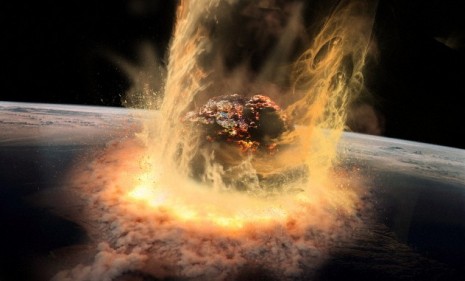Could an asteroid destroy Washington, D.C?
A giant asteroid capable of flattening an entire city could be on course to hit Earth, say scientists. The good news? It won't be here for another 172 years

The idea of a giant asteroid causing untold destruction has inspired countless disaster movies, but it's never really been considered a threat to humanity. Now, scientists at the University of Valladolid in Spain have warned that a giant asteroid really might be on course to collide with our planet — but not until 2182. (Watch a report, heavy on theatrics, on the asteroid threat.) Here's a quick guide to the asteroid on its way to Earth:
What are the odds of this asteroid hitting Earth?
The rock, which has been given the catchy title of "(101955) 1999 RQ36," has a one in 1,000 chance of impacting Earth on Sept. 24, 2182. Given the enormity of space, those are extremely high odds of impact, especially as there is still uncertainty as to its exact trajectory. Scientists will not be sure whether it will hit us until 2082.
The Week
Escape your echo chamber. Get the facts behind the news, plus analysis from multiple perspectives.

Sign up for The Week's Free Newsletters
From our morning news briefing to a weekly Good News Newsletter, get the best of The Week delivered directly to your inbox.
From our morning news briefing to a weekly Good News Newsletter, get the best of The Week delivered directly to your inbox.
How big is it?
The asteroid is about 612 yards wide, according to scientists. If that doesn't sound very large, consider that the last significant piece of space debris to hit earth — the Tunguska comet, in 1908 — destroyed 830 square miles of Siberian forest. This asteroid is about 10 times larger.
What would happen if it hit Earth?
It would cause "widespread devastation", and be "highly destructive to life on Earth, no matter where it hit." According to NASA, an asteroid this size could create "blast waves, earthquakes, fires, and tidal waves," and leave millions dead. If it hit a large metropolitan area like Washington, D.C, all that would be left is a crater several miles wide. "You wouldn't want to be at ground zero," one astronomer told The Sun.
A free daily email with the biggest news stories of the day – and the best features from TheWeek.com
How big would an asteroid have to be to end life on Earth?
Any asteroid over 1,000 yards in width would create a nuclear winter, killing all plant life on the planet and likely all human life, too. The asteroid blamed for wiping out the dinosaurs is thought to have been 7.5 miles wide. The largest asteroid discovered by human scientists is roughly 18 miles wide. If that struck Earth, it would eradicate all but microbiotic life.
What can we do to stop this one?
Nothing just yet. It would be moving far too quickly — around 25 kilometers a second — for any currently available technology to change its path. Only when scientists are sure it will impact on earth will "technologically and financially feasible" ways to destroy or deflect it be examined. In other words, it's a bit too early to deploy Bruce Willis.
Are there any other asteroids on their way here?
A 328-yard asteroid will hurtle past Earth on April 13, 2029 (yes, it's a Friday). The rock, known as Apophis, is expected to miss the planet by just 18,300 miles — that's closer than most TV satellites orbiting the Earth. If it did hit, the force would be 65,500 times stronger than the atomic bomb dropped on Hiroshima. But the odds it will alter course to impact on us are around one in 250,000.
Why are we only finding out about this now?
Actually, the University of Valladolid discovered 1999 RQ36 last year, and the news only just caught the attention of the Spanish Foundation for Science and Technology, which put out a press release. "Whether this asteroid’s path is old news or not, we shouldn’t dawdle in thinking about how we might avoid it or asteroids like it," says Discovery Magazine's Andrew Moseman. "In this case, we’ve only got 172 years — and we already wasted one year getting the news out."
Sources: Christian Science Monitor, MSNBC, CBS News, Astrobiology Magazine
-
 Political cartoons for December 13
Political cartoons for December 13Cartoons Saturday's political cartoons include saving healthcare, the affordability crisis, and more
-
 Farage’s £9m windfall: will it smooth his path to power?
Farage’s £9m windfall: will it smooth his path to power?In Depth The record donation has come amidst rumours of collaboration with the Conservatives and allegations of racism in Farage's school days
-
 The issue dividing Israel: ultra-Orthodox draft dodgers
The issue dividing Israel: ultra-Orthodox draft dodgersIn the Spotlight A new bill has solidified the community’s ‘draft evasion’ stance, with this issue becoming the country’s ‘greatest internal security threat’